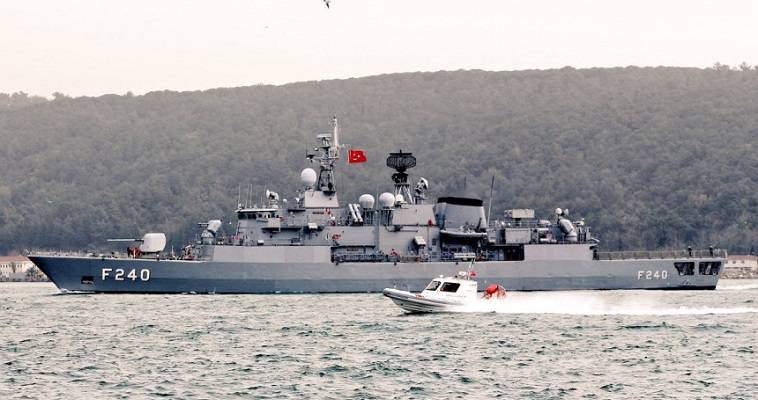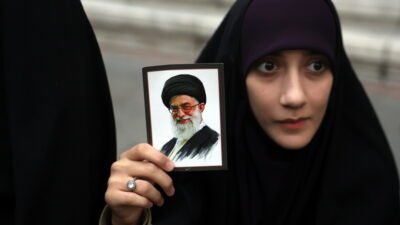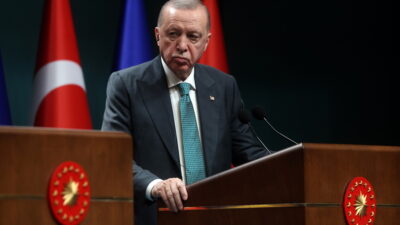Stavros Lygeros: How a Turkish frigate tried to ram a Greek warship, causing the address to the nation by PM Mitsotakis
13/08/2020
There was an attempt to ram the Greek frigate “Lemnos”, shadowing the Oruc Reis escorted by the Turkish frigate Kemal Reis on Wednesday at noon. Through this action, Ankara tried to get rid of the obstacles posed by the Hellenic Navy in its effort to continue the illegal Turkish surveys in the Greek EEZ south of Kastellorizo.
According to reliable information, the Greek frigate avoided the ramming, as a result of which the Turkish frigate suffered serious damage. The incident did not continue, but it was decided in Athens that the prime minister should send a clear warning message to Ankara. This was the meaning of his extraordinary address, in which he indirectly referred to the incident, saying that when so many warships are concentrated in a small area, control can be lost.
The message that PM Mitsotakis sent to Ankara is that Greece is open to negotiations (but, not under threat), but also that it will use its armed forces to defend its sovereign rights. His apparent anxiety was probably due to the fact that the aforementioned incident had preceded the address, but also to his decision not to back down with all that entails.
Intense diplomatic activity was registered in the same context. Mitsotakis’ telephone conversation with presidents Sisi and Macron was not only intended to inform them of the incident and the visible danger of a flare up, but also to send the message to Ankara that Greece is not alone. The episode will be – according to reliable information – also on the agenda of the Dendias-Pompeo meeting.
From the way the Turkish offensive movement developed, Greece benefits twofold. First, because the Greek frigate managed to turn the Turkish action into a boomerang. Secondly, because – according to information – there is a record that shows the Turkish aggressive action. We should note that from this site we had predicted that in case the Hellenic Navy tried to block Turkish research, the Turks would try to ram a Greek warship.
The fact that Oruc Reis left the potential Greek EEZ and entered the Cypriot EEZ is more proof that Ankara actually lost on points, in this round. It was forced, even for the time being, to withdraw its ship, without carrying out the announced research, a fact that is a success for the Greek side. Conversely, it “crumpled” Erdogan’s prestige that was based on a show of force. It is very likely, however, that Oruc Reis will return to the disputed area, in an attempt for a “revanche” …
A pre-ordained crisis
The current crisis was not just a bolt out of the blue. The publication in the Turkish Government Gazette months ago of the request of the state oil company TRAO for seismic surveys outside the Greek territories in the arc Kastellorizo-Rhodes-Karpathos-Kasos-Crete was the preparatory move and the confirmation that the Turkish – Libyan memorandum was signed. in order to be applied, so it was only a matter of time before things reached a head.
The signing of the Cairo Agreement simply hastened the crisis, without this meaning that it should not have been signed (any objections to this are of a different nature). The only way to avoid the crisis is to share Greek sovereign rights (at first, the Greek EEZ) with Turkey. But it is very doubtful that even this would somehow close the Greek-Turkish, for good. Athens would just buy time, at great expense.
What the Greek political and media system has only just begun to realize is that Ankara has “leveled up”. It does not only seek to extract a part of the EEZ which, based on international law, potentially belongs to Greece. Nor does it claim only some Greek rocky islets near the Turkish coast. Nor is it afraid that it will “choke” if Greece extends its territorial waters to 12 miles. And of course it does not ask for the demilitarization of the Greek islands of the eastern Aegean, because it is afraid that the military forces there aim to land on the coasts of Asia Minor!
The unilateral Turkish expansionist claims are applied one by one, but are enshrined in a broader context, like trees within a forest. The forest is the strategic goal of the Turks to bend any resistance of Greece, to shrink it and turn it into their satellite in the context of a neo-Ottoman order of things in the region. In essence, to indirectly annul the result of the Revolution of 1821.
This is the noticeable difference between the post-Kemalist and the neo-Ottoman regime. Kemalist Turkey sought from 1973-74 to “bite” into Greek sovereign rights and from 1996 to “bite” into territory through the theory of “gray zones”. Neo-Ottoman Turkey seeks all this, but additionally seeks to geostrategically subjugate Greece and of course Cyprus.
Efforts to reach an agreement with Turkey
From 1974 until this day, all Greek governments, in one way or another, have tried to close the front with Turkey once and for all. Some, in fact, were determined to make significant concessions to Ankara in order to achieve this. The fact that despite their intentions and sincere efforts, no one managed to reach a final agreement with Turkey proves something.
It proves that Ankara is asking for so much that no Greek government could agree to ceding. And if this was the case with Kemalist Turkey, it is valid twice with neo-Ottoman Turkey. Nevertheless, Greek former prime ministers and foreign ministers continue to reinforce the same stereotypes about the need to “show flexibility”, “abandon maximalism” and “acquire a spirit of compromise”.
These constitute rhetoric, without political backlash. At the helm of Greece, as a rule, were / are politicians who have “flexibility” and a “spirit of compromise” and hate “maximalism”. Therefore, all those who handled the Greek-Turkish issue must answer why they failed to solve the problem with Turkey with the recipe that they now propose, as wannabe saviors, as if it had not been tried repeatedly in the past.
In fact, all this literature, rich in wishful thinking, which is projected as unquestionable political wisdom – is an unmistakable sign of the strategic embarrassment that characterizes the Greek ruling elites. The bitter truth is that they are unable to “read” Turkey correctly. Thus, with the well-known tendency of ideological transformation, all these years they “borrowed” Western interpretive paradigms, which, of course, have always been influenced – if not dictated – by the interests of the Western metropolitan states.
The succor of illusions
Greece has been facing the “Turkish problem” – in its last phase – since 1973-74. Therefore, the ruling elites have no excuse for their blatant strategic embarrassment. For the fact that they have not developed a clear and credible strategy for preventing and halting Turkish expansion, which is based on well-equipped and prepared armed forces.
It is true that for decades the Greek ruling elites have resorted to the succor of the illusion that EU membership works as a kind of shield. They understand that our partners will not fight for Greece, but they subconsciously liked, and still like, to believe that somehow Europe will eventually intervene to protect its member. The fact that the EU tolerated the prolonged rape of the Cypriot EEZ by Turkey should have taught Athens some things.
Obviously, the EU does not want a Greek-Turkish conflict, but it is clear that there is no single political will for joint action. The large Member States have their own agenda, with the result that the EU has become a forum where decisions are usually taken on the minimum common denominator. And as a rule, the minimal common denominator is not capable of drastically influencing international situations, with the result that the EU, as a block, has remained a political midget.
Turkey “levels up”
In this landscape, the further qualitative escalation of the Turkish aggression manifested itself, with a “leveling up”:
- Ankara’s first move was the signing of the memorandum with Tripoli (November 2019), which Greece dealt with through purely diplomatic means and in fact not drastically.
- The second move was the hybrid attack on Evros with illegal immigrants, which was repulsed by the political determination of the Mitsotakis government and the successful mobilization of the army, the police and the National Guard.
- The third move is the start of implementation of the Ankara-Tripoli memorandum. As usual and as it did in the Cypriot EEZ, Turkey tried to gradually approach its goal. Initially to create a fait accompli through the Oruc Reis in the Greek EEZ, south and at a distance from Kastellorizo. The next step would be to be to send it outside Greek territorial waters along the Rhodes-Kasos-Karpathos-Crete arc, unless before going there they made a stop to survey outside Kastellorizo.
Having the positive aura from the successful response to the attack in Evros, the Mitsotakis government tried to prevent the illegal Turkish surveys, on the one hand by mobilizing the armed forces, on the other hand by accepting the start of bilateral negotiations mediated by Germany. This is how de-escalation was achieved. Having always in mind the neutralization of the Ankara-Tripoli memorandum as much as possible, the Greek side signed the Cairo Agreement, albeit with many cessions on the part of Athens.
As it is known, Erdogan considered that this Agreement violated the moratorium he had discussed with Merkel, although Mitsotakis never promised to freeze Greek diplomacy. Thus we reached the second twin crisis with the Oruc Reis on the potential Greek continental shelf laying sounding cables, but unable to conduct research due to the presence of a significant number of warships around it. This is how we got to the incident, which now forces the Greek government and political system as a whole to abandon delusions and land in harsh reality.





